人教版(2019)选择性必修第二册Unit 3 Food and Culture Discover Useful Structures 课件(共16张PPT)
文档属性
| 名称 | 人教版(2019)选择性必修第二册Unit 3 Food and Culture Discover Useful Structures 课件(共16张PPT) | 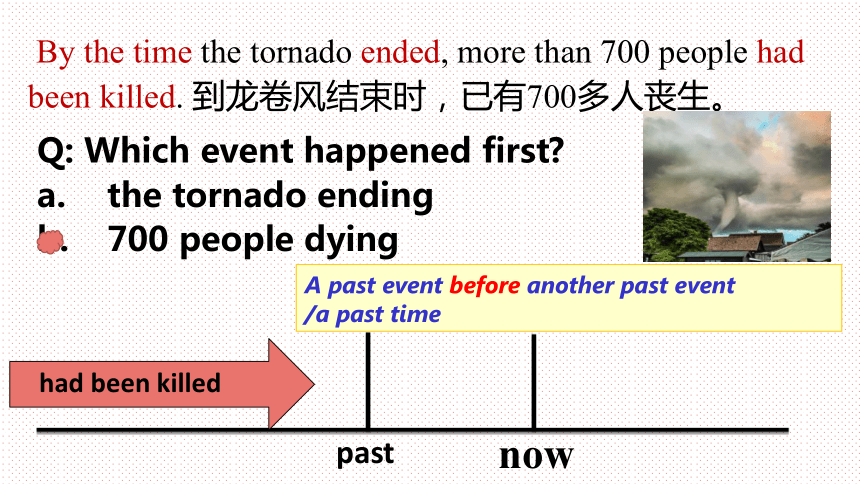 | |
| 格式 | pptx | ||
| 文件大小 | 622.5KB | ||
| 资源类型 | 教案 | ||
| 版本资源 | 人教版(2019) | ||
| 科目 | 英语 | ||
| 更新时间 | 2024-01-08 12:18:38 | ||
图片预览

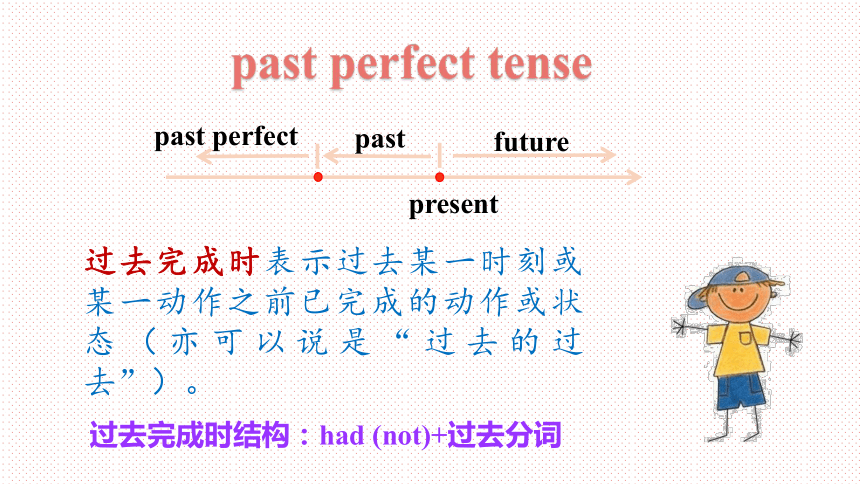
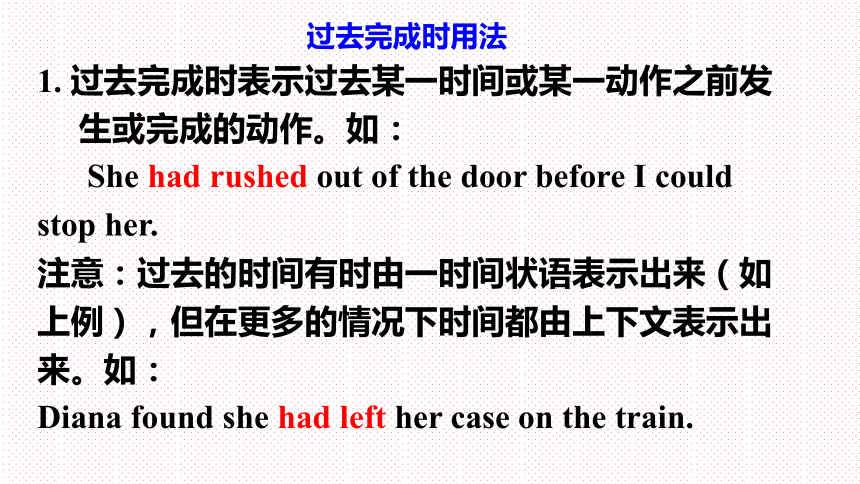
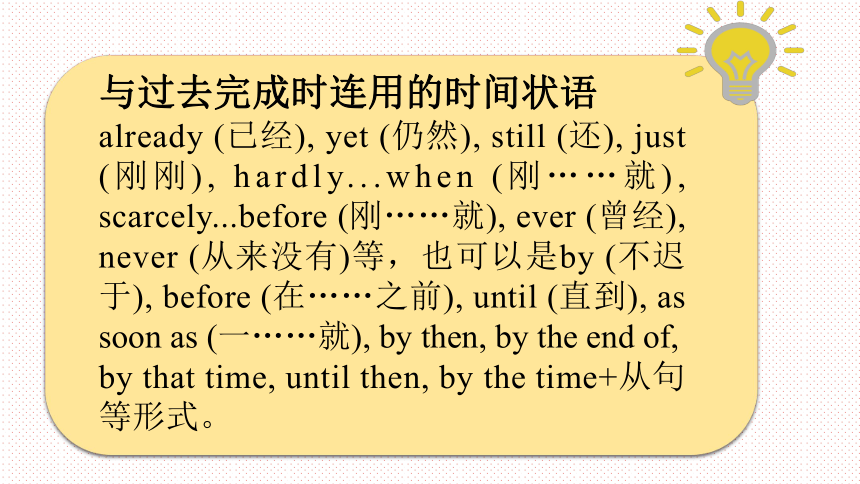
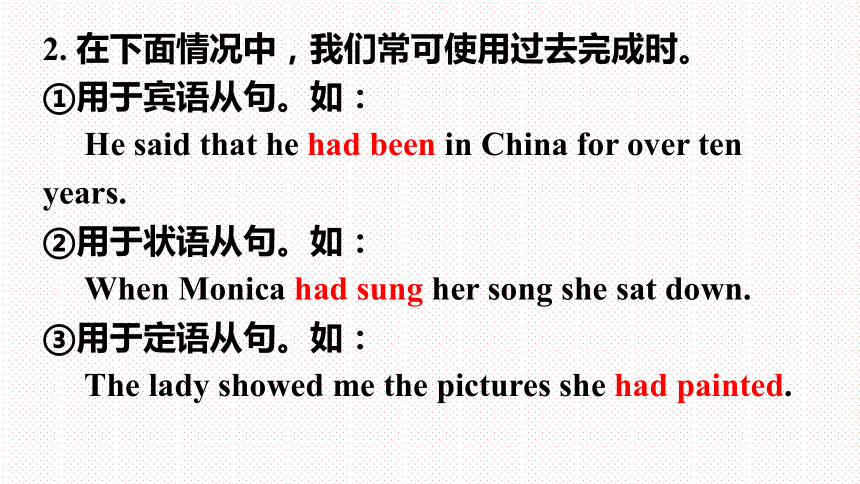
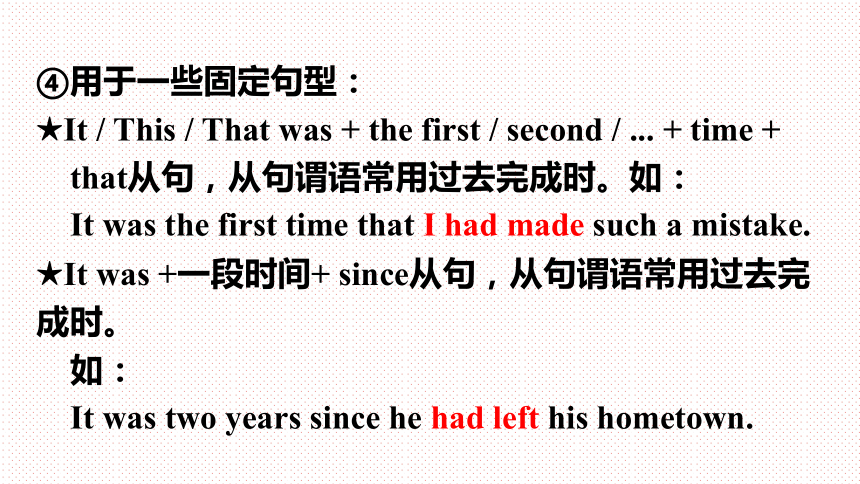
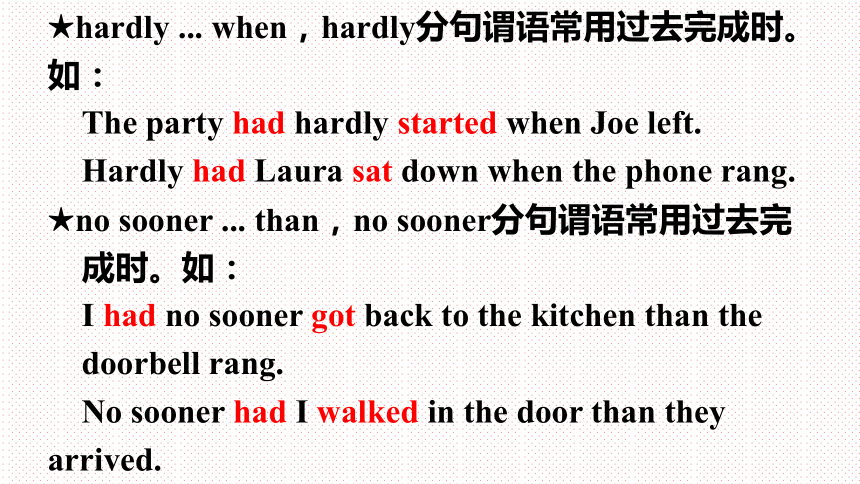
文档简介
(共16张PPT)
By the time the tornado ended, more than 700 people had been killed. 到龙卷风结束时,已有700多人丧生。
Q: Which event happened first
the tornado ending
700 people dying
past
had been killed
A past event before another past event
/a past time
now
过去完成时表示过去某一时刻或某一动作之前已完成的动作或状态(亦可以说是“过去的过去”)。
present
future
past
past perfect
past perfect tense
过去完成时结构:had (not)+过去分词
1. 过去完成时表示过去某一时间或某一动作之前发生或完成的动作。如:
She had rushed out of the door before I could stop her.
注意:过去的时间有时由一时间状语表示出来(如上例),但在更多的情况下时间都由上下文表示出来。如:
Diana found she had left her case on the train.
过去完成时用法
与过去完成时连用的时间状语
already (已经), yet (仍然), still (还), just (刚刚), hardly...when (刚……就), scarcely...before (刚……就), ever (曾经), never (从来没有)等,也可以是by (不迟于), before (在……之前), until (直到), as soon as (一……就), by then, by the end of, by that time, until then, by the time+从句等形式。
2. 在下面情况中,我们常可使用过去完成时。
①用于宾语从句。如:
He said that he had been in China for over ten years.
②用于状语从句。如:
When Monica had sung her song she sat down.
③用于定语从句。如:
The lady showed me the pictures she had painted.
④用于一些固定句型:
★It / This / That was + the first / second / ... + time + that从句,从句谓语常用过去完成时。如:
It was the first time that I had made such a mistake.
★It was +一段时间+ since从句,从句谓语常用过去完成时。
如:
It was two years since he had left his hometown.
★hardly ... when,hardly分句谓语常用过去完成时。如:
The party had hardly started when Joe left.
Hardly had Laura sat down when the phone rang.
★no sooner ... than,no sooner分句谓语常用过去完成时。如:
I had no sooner got back to the kitchen than the doorbell rang.
No sooner had I walked in the door than they arrived.
⑤用于hope, intend, mean, think等动词表示未实现的愿望时。如:
I had intended visiting him this weekend but I wasn’t able to make it.
I had thought to return early but they wouldn’t let us go.
表示过去某个时间或事件之前发生的动作一直延续到过去的另一时间或动作,此时谓语应为延续性动词
误:He has died for three years.
正:He has been dead for three years.
正:He died three years ago.
误:It raind at eight yesterday morning.
正:It began to rain at eight yesterday morning.
active
passive
The room looked nice. Somebody had cleaned it.
The room looked nice. It had been cleaned.
had done
had been done
例句变形
语法结构
B
Cricket had (not) been played by them before the rain started.
C
Had (not) they played cricket before the rain started
D
Had (not) cricket been played by them before the rain started
E
Where had they played cricket before the rain started
A
They had (not) played cricket before the rain started.
F
Where had cricket been played by them before the rain started
构成
陈述句的主动语态 (肯定/否定义) 主语+had (not)+过去分词+宾语+其他成分
陈述句的被动语态 (肯定/否定义) 主语+had (not)+been+过去分词+介词+宾语+其他成分
一般疑问句的主动语态 (肯定/否定义) Had (not)+主语+过去分词+宾语+其他成分
一般疑问句的被动语态 (肯定/否定义) Had (not)+主语+been+ 过去分词+介词+宾语+其他成分
特殊疑问句的主动语态 (肯定/否定义) 疑问词+had (not)+主语+过去分词+宾语+其他成分
特殊疑问句的被动语态 (肯定/否定义) 疑问词+had (not)+主语+been+过去分词+介词 +宾语+其他成分
“他们”
“打板球”
“下起雨来”
√
1.He asked me ____ during the summer holidays.
A. where I had been B. where I has gone
C. where had I been D. where had I gone
2. What ___ Jane ____ by the time he was seven
A. did; do B. has; done
C. did; did D. had; done
3. I ______ 900 English words by the time I was ten.
A. learned B. was learning
C. had learned D. has learned
一、选择正确的选项
√
√
√
√
4. By the time my parents reached home yesterday, I _____ the dinner already.
A. had cooked B. cooked
C. have cooked D. was cooked
5. She said she __________ the principle already.
A. has seen B. saw
C. will see D. had seen
6. She said her family _______ themselves from the army during the war.
A. has hidden B. had hidden
C. has hidden D. have hidden
一、选择正确的选项
√
√
√
1. Carol: _____ you ever ______ (taste) any Scottish food before your trip to St. Andrews last year
Paul: No, not really. But I ____________(tell) about haggis many times before we went there.
Had
tasted
had been told
Carol: Oh…Did you try it
Paul: Oh, yes! You know what We _________ (arrive) late for supper that day, and so we just ate whatever was left in the university canteen. We ___________ (finish) our meal before we learnt we _____ just ______(eat) haggis!
Carol: My goodness!
Paul: Well, it was not bad. I have to say…
arrived
had finished
had
eaten
2. Carol: When I got to the teahouse yesterday, I found nobody there. _____ it ______________ (cancel)
Paul: Oh, I’m so sorry that I forgot to tell you! The get-together was cancelled yesterday morning because Sally, the hostess, ___________ (get) into a car accident .
Carol: Oh, I’m sorry to hear that. Hope Sally recovers soon!
Had
been cancelled
had got
By the time the tornado ended, more than 700 people had been killed. 到龙卷风结束时,已有700多人丧生。
Q: Which event happened first
the tornado ending
700 people dying
past
had been killed
A past event before another past event
/a past time
now
过去完成时表示过去某一时刻或某一动作之前已完成的动作或状态(亦可以说是“过去的过去”)。
present
future
past
past perfect
past perfect tense
过去完成时结构:had (not)+过去分词
1. 过去完成时表示过去某一时间或某一动作之前发生或完成的动作。如:
She had rushed out of the door before I could stop her.
注意:过去的时间有时由一时间状语表示出来(如上例),但在更多的情况下时间都由上下文表示出来。如:
Diana found she had left her case on the train.
过去完成时用法
与过去完成时连用的时间状语
already (已经), yet (仍然), still (还), just (刚刚), hardly...when (刚……就), scarcely...before (刚……就), ever (曾经), never (从来没有)等,也可以是by (不迟于), before (在……之前), until (直到), as soon as (一……就), by then, by the end of, by that time, until then, by the time+从句等形式。
2. 在下面情况中,我们常可使用过去完成时。
①用于宾语从句。如:
He said that he had been in China for over ten years.
②用于状语从句。如:
When Monica had sung her song she sat down.
③用于定语从句。如:
The lady showed me the pictures she had painted.
④用于一些固定句型:
★It / This / That was + the first / second / ... + time + that从句,从句谓语常用过去完成时。如:
It was the first time that I had made such a mistake.
★It was +一段时间+ since从句,从句谓语常用过去完成时。
如:
It was two years since he had left his hometown.
★hardly ... when,hardly分句谓语常用过去完成时。如:
The party had hardly started when Joe left.
Hardly had Laura sat down when the phone rang.
★no sooner ... than,no sooner分句谓语常用过去完成时。如:
I had no sooner got back to the kitchen than the doorbell rang.
No sooner had I walked in the door than they arrived.
⑤用于hope, intend, mean, think等动词表示未实现的愿望时。如:
I had intended visiting him this weekend but I wasn’t able to make it.
I had thought to return early but they wouldn’t let us go.
表示过去某个时间或事件之前发生的动作一直延续到过去的另一时间或动作,此时谓语应为延续性动词
误:He has died for three years.
正:He has been dead for three years.
正:He died three years ago.
误:It raind at eight yesterday morning.
正:It began to rain at eight yesterday morning.
active
passive
The room looked nice. Somebody had cleaned it.
The room looked nice. It had been cleaned.
had done
had been done
例句变形
语法结构
B
Cricket had (not) been played by them before the rain started.
C
Had (not) they played cricket before the rain started
D
Had (not) cricket been played by them before the rain started
E
Where had they played cricket before the rain started
A
They had (not) played cricket before the rain started.
F
Where had cricket been played by them before the rain started
构成
陈述句的主动语态 (肯定/否定义) 主语+had (not)+过去分词+宾语+其他成分
陈述句的被动语态 (肯定/否定义) 主语+had (not)+been+过去分词+介词+宾语+其他成分
一般疑问句的主动语态 (肯定/否定义) Had (not)+主语+过去分词+宾语+其他成分
一般疑问句的被动语态 (肯定/否定义) Had (not)+主语+been+ 过去分词+介词+宾语+其他成分
特殊疑问句的主动语态 (肯定/否定义) 疑问词+had (not)+主语+过去分词+宾语+其他成分
特殊疑问句的被动语态 (肯定/否定义) 疑问词+had (not)+主语+been+过去分词+介词 +宾语+其他成分
“他们”
“打板球”
“下起雨来”
√
1.He asked me ____ during the summer holidays.
A. where I had been B. where I has gone
C. where had I been D. where had I gone
2. What ___ Jane ____ by the time he was seven
A. did; do B. has; done
C. did; did D. had; done
3. I ______ 900 English words by the time I was ten.
A. learned B. was learning
C. had learned D. has learned
一、选择正确的选项
√
√
√
√
4. By the time my parents reached home yesterday, I _____ the dinner already.
A. had cooked B. cooked
C. have cooked D. was cooked
5. She said she __________ the principle already.
A. has seen B. saw
C. will see D. had seen
6. She said her family _______ themselves from the army during the war.
A. has hidden B. had hidden
C. has hidden D. have hidden
一、选择正确的选项
√
√
√
1. Carol: _____ you ever ______ (taste) any Scottish food before your trip to St. Andrews last year
Paul: No, not really. But I ____________(tell) about haggis many times before we went there.
Had
tasted
had been told
Carol: Oh…Did you try it
Paul: Oh, yes! You know what We _________ (arrive) late for supper that day, and so we just ate whatever was left in the university canteen. We ___________ (finish) our meal before we learnt we _____ just ______(eat) haggis!
Carol: My goodness!
Paul: Well, it was not bad. I have to say…
arrived
had finished
had
eaten
2. Carol: When I got to the teahouse yesterday, I found nobody there. _____ it ______________ (cancel)
Paul: Oh, I’m so sorry that I forgot to tell you! The get-together was cancelled yesterday morning because Sally, the hostess, ___________ (get) into a car accident .
Carol: Oh, I’m sorry to hear that. Hope Sally recovers soon!
Had
been cancelled
had got
